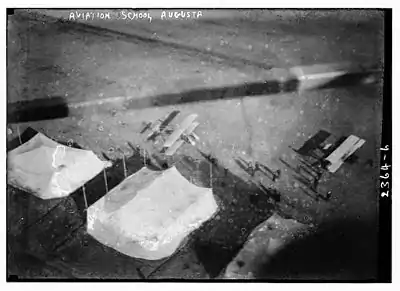
Facility in Augusta, Georgia circa 1911
The Wright Flying School, also known as the Wright School of Aviation, was operated by the Wright Company from 1910 to 1916 and trained 119 individuals to fly Wright airplanes.
History
Orville Wright began training students on March 19, 1910 in Montgomery, Alabama at a site that later became Maxwell Air Force Base. With the onset of milder weather that May, the school relocated to Huffman Prairie Flying Field near Dayton, Ohio, where the Wrights developed practical aviation in 1904 and 1905 and where the Wright Company tested its airplanes. They also had a facility in Augusta, Georgia run by Frank Coffyn.[1] Some of the earliest graduates became members of the Wright Exhibition Team.
Sites

National Park Service marker at the location of the Huffman Prairie Flying Field school
- Maxwell Air Force Base in Montgomery, Alabama
- Huffman Prairie Flying Field near Dayton, Ohio
- Augusta, Georgia[1]
Notable students
- 1st Lt. Henry H. Arnold (1886–1950)
- 1st Lt. Thomas DeWitt Milling (1887–1960)
- Calbraith Perry Rodgers (1879–1912) started on June 5, 1911. Within a week, his instructor was letting him takeoff, fly, and land the airplane, but when he asked to be allowed a solo flight, the instructor said "no". Rodgers then bought the training airplane, a Wright Flyer Model B, the first to be privately owned.
- Oscar Brindley (1885–1918)
- Walter Richard Brookins (1889–1953)
- Howard W. Gill (1882–1912)
- Oliver LeBoutillier (1894-1983)
- Philip Orin Parmelee (1887–1912)[2][3]
- Leda Richberg-Hornsby (1886–1939)[4]
- Marjorie Stinson (1895–1975)[5]
- Edward Stinson (1893–1932)[5]
- J. Clifford Turpin (1886–1966)
- Arthur L. "Al" Welsh (1881–1912) learned to fly and then in the summer of 1910 became an instructor at the Wright Company's flying school.[6]
- George William Beatty (1887–1955) was taught by Al Welsh, taking his first lesson on June 24, 1911 and soloing on July 23, 1911. That same day he flew as a passenger with Welsh to establish a new American two-man flight altitude record of 1,860 feet (570 m); and on August 5, 1911 Beatty broke his own record, flying to 3,080 feet (940 m) with Percy Reynolds as his passenger.
References
- 1 2 "Aviation School Starts In Augusta. Among Coffyn's First Pupils Are Robert Collier and J. S. Burgess". Atlanta Constitution. January 15, 1911. Retrieved 2010-11-02.
- ↑ "Aviator Parmelee Plunges to Death. Caught by Treacherous Gust of Wind While Giving Exhibition Flight in Washington State". New York Times. June 2, 1912. Retrieved 2007-07-21.
Philip Parmelee, the aviator, was killed here today while giving an exhibition flight from the fair grounds. Parmalee was the flying partner of Clifford Turpin, whose airship flew into the grandstand at Seattle Thursday, killing two persons and injuring fifteen.
- ↑ "Parmalee is Killed". Los Angeles Times. June 2, 1912. Retrieved 2009-08-04.
Aviation Star Has Fatal Fall. Graduate of Wright School Meets His Death at North Yakima, Wash. Biplane in High Wind Flutters and Dives from Four Hundred Feet. His Fiancee Is Among First to Reach Crushed Body of Fallen Birdman. Gives Life as Toll to Aerial Navigation.
- ↑ "At 23 Woman Who Eloped Joins Navigators of the Air." New York Sun. March 30, 1914.
- 1 2 "Stinson Field". National Park Service. Archived from the original on 2007-12-27. Retrieved 2009-09-04.
- ↑ "Lieut. Hazelhurst and Al Welsh, Professional Aviator, Victims of Airship Test". New York Times. June 12, 1912. Retrieved 2009-09-04.
Lieut. Leighton W. Hazelhurst, Jr., of the Seventeenth Infantry, one of the most promising of the younger aviators of the army, and Al Welsh, one of the most daring professional aviators in America, were instantly killed in a flight at the Army Aviation School at College Park, Md., at 6:30 o'clock this evening.
External links
- Pioneer Flyers Who Trained At Wright Brothers Field Archived 2014-07-14 at the Wayback Machine
This article is issued from Wikipedia. The text is licensed under Creative Commons - Attribution - Sharealike. Additional terms may apply for the media files.